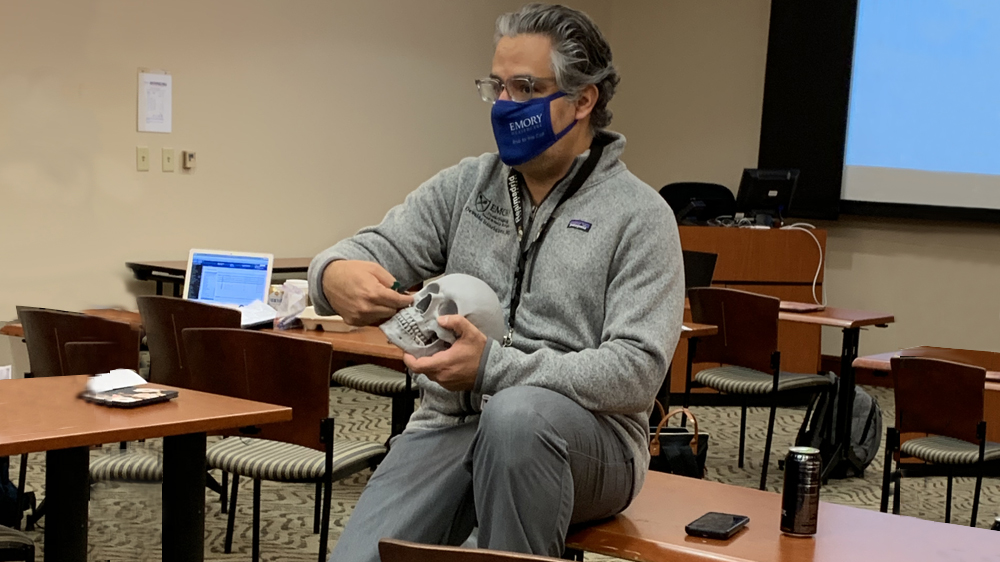PGY-1 (Internship)
As a PGY-1 you will spend two months on Grady Memorial Hospital's otolaryngology service, two months on the otolaryngology service at Emory University Hospital Midtown, one month on the pediatric otolaryngology service at Children's Healthcare of Atlanta Arthur M. Blank Hospital, and one month on Emory University Hospital's otolaryngology consult service.
The remaining six months will be spent off-service on relevant rotations, including pediatric surgery at Children's Healthcare of Atlanta Arthur M. Blank Hospital, general surgery (breast/melanoma/endocrine service), neurosurgery, anesthesia, ICU, and oral and maxillofacial surgery. All off-service intern year rotations are designed to enhance your education through interactions with relevant services.
PGY-2 through PGY-5
These training years will consist of one-to-four month rotations through a number of teams. The Emory Clinic absorbs a substantial portion of early training so that residents become familiar with outpatient management of common and complex otolaryngologic problems. The curriculum includes ample rotations throughout the subspecialties, including the Emory Voice Center; Sinus, Nasal and Allergy Center; Head & Neck; and Otology. Residents will also rotate at the Emory Aesthetic Center, which encompass a portion of our program's facial plastic surgery training.
Additional non-subspecialty time will be spent as a junior and senior resident at Grady Memorial Hospital and the Atlanta VA Medical Center.
During the PGY-4 year, residents dedicate three months to a research experience.
All rotations are designed for graded responsibility during the progression that leads to senior residency. To maximize educational benefits, rotation schedules are subject to change based upon resident feedback during biannual reviews.
Lectures and Conferences
Otolaryngology Department Grand Rounds
-
Held weekly on Thursday mornings with invited guest faculty, departmental faculty, fellow, and resident (PGY-3 and PGY-5) presentations
-
Bimonthly Morbidity and Mortality Conferences during Grand Rounds sessions
Resident Didactic Sessions
-
Four hours of protected time every Thursday morning is dedicated to resident education
-
Each academic year is divided into dedicated clinical subspecialty blocks designed to provide structured learning in all otolaryngology subspecialties
-
Education resources are provided by the department, including access to online textbooks, question banks, and study guides
Annual Dissection and Surgical Training Courses
-
Throughout the year, the department hosts multiple dissection and surgical training courses covering various subject areas and led by faculty experts in their respective fields, including the following:
-
Temporal Bone and Lateral Skull Base Dissection Course
-
Facial Plastic Surgery Rhinoplasty and Soft Tissue Dissection
-
Endoscopic Sinus Surgery and Transnasal Endoscopic Skull Base Surgery Courses
-
Pediatric Airway Management Mini-Course
-
Head and Neck Ultrasound Mini-Course
-
Laryngology and Phonosurgery Mini-Course
-
-
The department also sends residents to various regional and national courses designed to further their knowledge and skill acquisition while providing an opportunity to connect with faculty and residents from other programs. Examples in recent years have include the Duke ENT Bootcamp, the Carolinas' Pediatric Airway Course, and the Southern States Rhinology Course.
Tumor Boards
-
Head & Neck: During head and neck multidisciplinary clinic at Emory University Hospital Midtown
-
Thyroid: Monthly at Emory University Hospital Midtown
-
Grady Memorial Hospital: Every other week
Residency Tracks
The Emory University School of Medicine (EUSOM) and Graduate Medical Education (GME) Office recognizes that some residents have the desire to gain knowledge and skills in a specific focus area related to healthcare but outside the normal residency program curriculum. To this end, the GME Office has developed residency tracks that complement but do not replace any aspect of residency training. Several otolaryngology residents have participated in these tracks, including the global health, healthcare management, patient safety and quality improvement, and medical education tracks. Upon completion of a track, residents are awarded a Certificate of Distinction from the School of Medicine.


